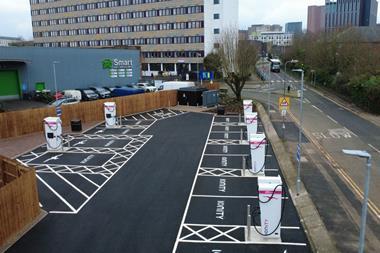
The upcoming ban on the sale of petrol- and diesel-engined vehicles is going to be a mess but it’s good news for today’s forecourt operators. That was the view of Christie & Co managing director of retail, Steve Rodell, who was speaking to Forecourt Trader after the unveiling of the company’s Business Outlook 2023 report.
“Come 2029, you’ll still have people buying their last diesel and petrol cars, intending to run them for 15-20 years. I mean we’ve already seen in the last week or two, manufacturers talking about reducing manufacture of EVs because they’re just not selling the vehicles. And then there are stories about people having difficulties with EVs. Yes, they are teething problems in an industry which is new, but they have deterred people from going down that route.”
He said this meant the point at which forecourt operators have to worry about volume loss is being nudged out a little bit further.
“We did some research, which found that it will take until the mid 2040s to get to the point where you might see 50% of the car parc becoming EV. That date could move either way. We could suddenly have a booming economy, and everybody buys a car, or we could drag along for five years and not a lot happens.”
With regard to the property side of the forecourt sector, Rodell said there are still not enough forecourts coming to market to satisfy demand. However, he did have one caveat for anyone who wants to sell and that was that the pricing was spot on.
“It all comes back to looking at the finances that are being presented. You might have an operator that has accounts that ran to the middle of 2022. That’s great but we want to know what’s happened in the last six months to their utility costs. And their wage bills because they’re the two fundamental bits that can squeeze the profit. Up-to-date trading information is going to be important as are realistic expectations on prices. There’s no price slashing going on, but the price has got to be right. We transact a lot of sites so we’re there at the coalface talking to the buyers in the market, and we know what they’re prepared to pay.”
Rodell said there was a 1.5% increase in Christie & Co’s retail price index for 2022. “In the current economic environment, anything flat or positive, I think is a good thing. There’s no sensational 10% so steady as she goes is probably good.”
At the Report’s unveiling at the British Museum, the four main themes discussed were cost pressures in the business, the political environment, sustainability and the workforce.
On cost pressures, Rodell said: “As costs rise, you’re squeezing the level of profits. Your fuel volumes may still be a little bit down on pre-Covid levels so If you want to maintain your level of profit, you’ve got to really look at what’s being sold in the shop. I think retailers really need to look at introducing higher margin products such as vaping and fresh food to go. This is important because at the end of the day, from our perspective, a site’s valuation is based on profit.”
Rodell also pointed to the obvious cost-saving measures such as putting doors on fridges and having
efficient lighting and heating systems.
Talk about the political environment was all about Net Zero, and political journalist Robert Peston, who hosted Christie & Co’s Report event, told the audience that no government is likely to change track on the “road to zero”. “Peston said that it doesn’t matter which party gets into power, the road to zero policy, is a cross-party agreement so they need to get there,” said Rodell.
On sustainability, Rodell talked about the new Minimum Energy Efficiency Standards, which are coming into force this year. These are important because you won’t be able to buy or sell a commercial property without the minimum standard in place. This means there’s going to be capital expenditure required for many site operators who want to sell.
The final key talking point for Christie & Co was workforce and Rodell said: “Everyone knows that keeping hold of staff, when you’re in a competitive workplace environment, is really hard work because you’ve got probably a lot of staff on minimum wage. You’re going to need to look at other incentives to keep staff.”
Rodell had an interesting chat with Nisa boss Peter Batt (available to watch on the Christie website) where Bell discussed staff retention and the strategy Nisa was employing. This included staff discounts on products that really mattered to them but also other bespoke ways of maintaining staff loyalty. Bell mentioned tickets to football matches for footie fans, half-price driving lessons for someone with a teenager who was keen to learn or free nappies for mums, as some of the things they are considering.
Said Rodell: “These are things that are really valuable to the workers. And these don’t necessarily cost the business an enormous amount of money.”



























No comments yet